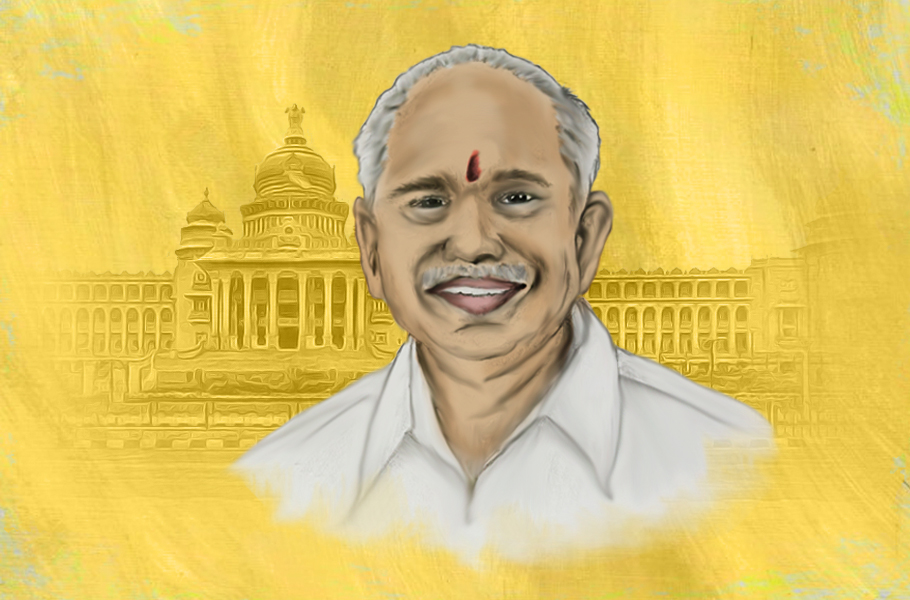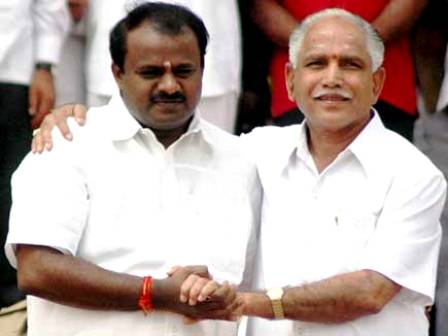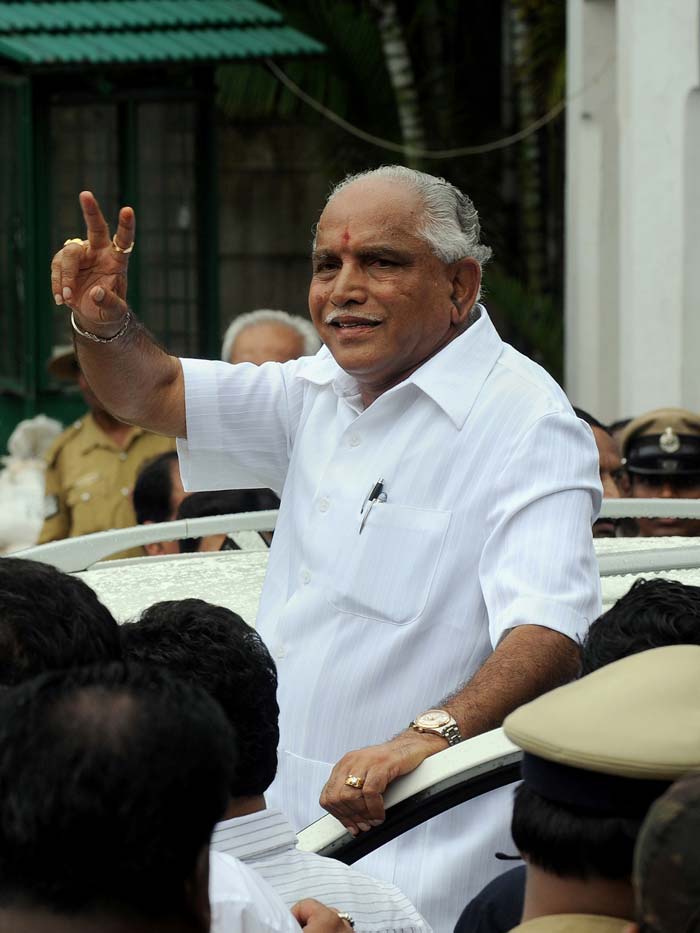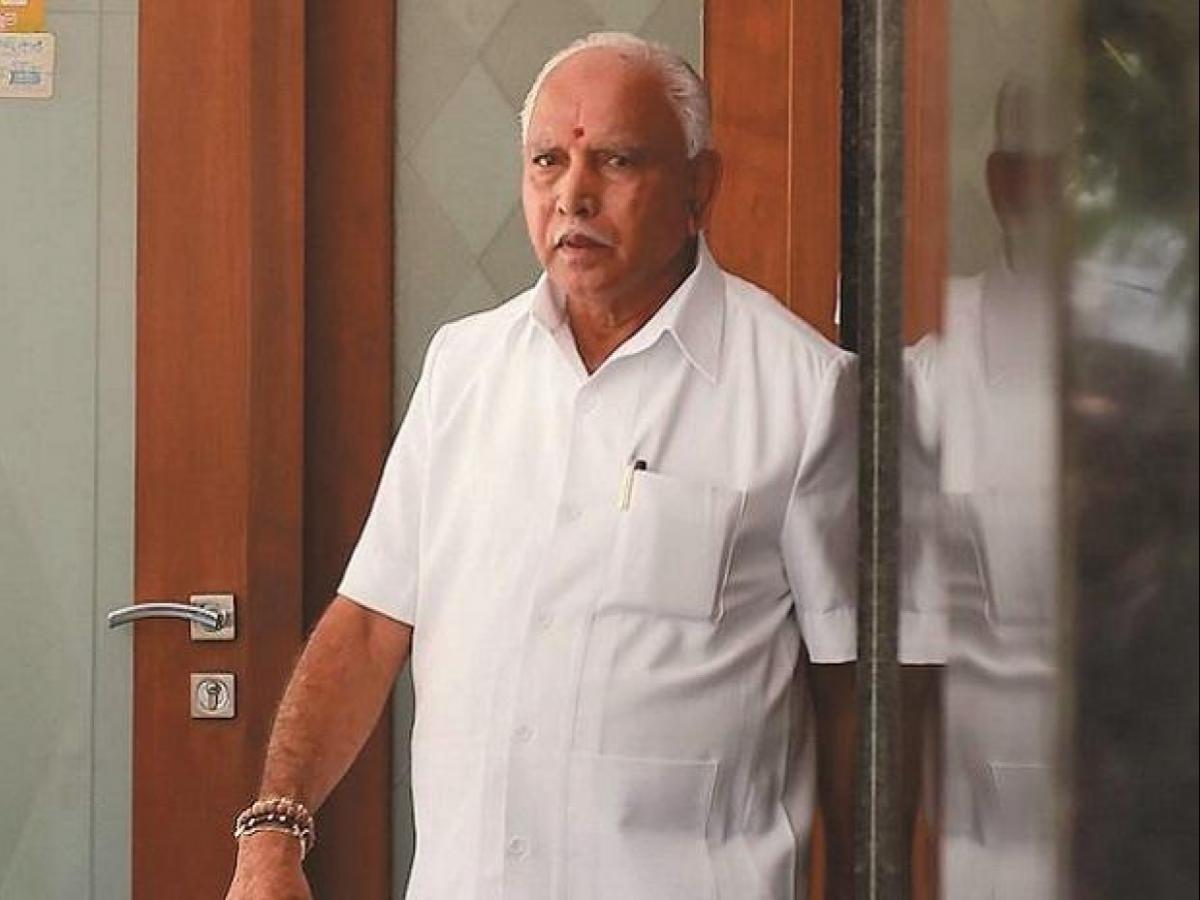
- Home
- News
- Analysis
- States
- Perspective
- Videos
- Education
- Entertainment
- Elections
- World Cup 2023
- Features
- Health
- Budget 2024-25
- Business
- Series
- NEET TANGLE
- Economy Series
- Earth Day
- Kashmir’s Frozen Turbulence
- India@75
- The legend of Ramjanmabhoomi
- Liberalisation@30
- How to tame a dragon
- Celebrating biodiversity
- Farm Matters
- 50 days of solitude
- Bringing Migrants Home
- Budget 2020
- Jharkhand Votes
- The Federal Investigates
- The Federal Impact
- Vanishing Sand
- Gandhi @ 150
- Andhra Today
- Field report
- Operation Gulmarg
- Pandemic @1 Mn in India
- The Federal Year-End
- The Zero Year
- Premium
- Science
- Brand studio
- Home
- NewsNews
- Analysis
- StatesStates
- PerspectivePerspective
- VideosVideos
- Entertainment
- ElectionsElections
- Sports
- Loading...
Sports - Features
- Budget 2024-25
- BusinessBusiness
- Premium
- Loading...
Premium

Yediyurappa, who fathered the BJP in Karnataka, now set to take the final bow
For Karnataka Chief Minister BS Yediyurappa, life, or rather politics, has come a full circle, having led the BJP from the scratch to the top in the state, and now set to take a bow.

For Karnataka Chief Minister Bookanakere Siddalingappa Yediyurappa, life, or rather politics, has come a full circle. Having slogged for the last 40 years building the Bharatiya Janata Party (BJP) from scratch in the state, he must be finding it ironical that today a section of his own party wants him out. And if speculation is right, even the party bosses in Delhi would like him to leave...
For Karnataka Chief Minister Bookanakere Siddalingappa Yediyurappa, life, or rather politics, has come a full circle. Having slogged for the last 40 years building the Bharatiya Janata Party (BJP) from scratch in the state, he must be finding it ironical that today a section of his own party wants him out. And if speculation is right, even the party bosses in Delhi would like him to leave the post of chief minister for which he worked, fought, succeeded, lost and finally grabbed, unmindful of scruples.
If in July 2019 Yediyurappa preyed on the then ruling Congress-Janata Dal (Secular) to return as chief minister for the fourth time (the third time was for a couple of days a year earlier), his second stint in 2008 was probably the most fitting. It came as the conclusion to a live soap drama that began with him being deprived of the post just a week after he ascended the coveted chair in Vidhana Soudha, the seat of Karnataka’s legislature.
Missed opportunities
Time and missed opportunities have always been a factor in 78-year-old Yediyurappa’s life. Having constructed the BJP from scratch from the time he got elected as the Shikaripura Taluk president of the party in 1980, he watched with dismay as the party just couldn’t make the cut. In 1983, the party could muster just 17 seats and in an attempt to oust Congress from power, he had to offer support to the Janata Party under Ramakrishna Hegde. The BJP then moved out of the spotlight.
Two decades passed and Karnataka became the turf of the Congress and the Janata Dal. During this time, Yediyurappa was simply unable to find the sweet spot to power. In 2004, despite becoming the single largest party with 79 seats of the total 224, the BJP was forced to sit in the opposition. A frustrated Yediyurappa saw the two rivals, Congress and the Janata Dal, coming together and forming a government, leaving the BJP high and dry.
That is when Yediyurappa may have decided that time was slipping by. He was aging and getting impatient. The BJP would possibly never get to the golden number of 113 Assembly seats. As a true-bred politician, not known for guile but seen more as an open fighter, he changed his style—akin to the shifting from an open batting stance in cricket to a closed stance. And, it worked.

Moving heaven and earth
In 2004, despite being in the ruling coalition, the JD(S) had internal problems. There were differences between the party chief HD Deve Gowda and his son HD Kumaraswamy. The son wanted the top seat which was then with the Congress’s Dharam Singh. Yediyurappa worked on Kumaraswamy and enticed him with the slot of chief minister if the JD(S) let go the Congress and aligned with the BJP.
The wily turn to Yediyurappa’s politics saw him jump close to the position of chief minister. He became deputy to Kumaraswamy in the 2006 coalition between the BJP and JD(S). He watched with glee the ditching of the Congress, and got ready to occupy the chief minister’s chair in 20 months. As per their power-sharing agreement, Kumaraswamy would step down in 20 months, after which Yediyurappa would ascend the “throne”.
Twenty months passed. Yediyurappa kept his side of the bargain. He let Kumaraswamy rule the roost. When it was time for the BJP leader to occupy the gaddi (post), there was a twist in the tale. Watched by the entire state, Kumaraswamy initially refused and later, reluctantly agreed. Yediyurappa became chief minister in November 2007, but just for a week. Kumaraswamy withdrew support and the newly formed government collapsed. It was an unforgettable drama that could match, and even outdo, any film script.
If Yediyurappa thought he had the political guile to outsmart his opponent, he did not reckon with more thoroughbred rivals in the game. Though his attempt to ascend the chair ended in tears, literally, it eventually won him massive brownie points among the electorate, transfixed by the unfolding drama.
Kumaraswamy had unabashedly betrayed a mutual agreement. He had hoped to continue with Congress support, which refused to play ball. The resulting election in 2008 saw the BJP emerge within an arm’s length distance of a simple majority, falling short by three seats.
A divine turn
Yediyurappa’s skills as a fighter was now combined with a new-found guile that finally saw him fix the minor anomaly by getting the support of independents and becoming chief minister in 2008, this time on his own strength. He was 65, and he had managed to achieve his goal at what is considered a relatively acceptable age for politics.
Not entirely sure about his own ability, perhaps, Yediyurappa turned to the gods, spirits and other-worldly souls too help him climb the political ladder. In October 2007, on the advice of numerologists, he changed the spelling of his name from Yediyurappa to Yeddyurappa.
Coincidentally, he became chief minister first in 2007 (for a week) and again in 2008. The second time, when he expected to sail through the full term, he had to resign, and was prosecuted on corruption charges. Eventually, in July 2019, when he got the latest chance to become chief minister, he quietly reverted to the original spelling of his name. But looks like that hasn’t worked either, since it is a matter of time before he steps down before completing his tenure.
An individual with a strong religious persuasion, Yediyurappa even suspected his rivals of using other-worldly powers to trouble him in politics and cast a so-called evil eye on him. To neutralise the bad effects, he reportedly was told by his personal astrologers to sleep in the buff for three days on a bare floor and do suryanamaskar in a river in the nude for 12 days, though it is difficult to fathom how he managed to do that. This was during the time when he was in trouble during his stint as chief minister in 2008.
The chief minister’s family priest Bhanuprakash Sharma was quoted as saying he had asked Yediyurappa to make offerings to the Chamundeshwari temple in Mysore and “Ganapathi homa” with an offering of one lakh modak (a local delicacy).
His relatives also reportedly undertook the so-called Ekadasi Maha Rudra Yaga in Mandya district, near Bangalore, to seek protection from the gods against the black magic against Yediyurappa by his rivals who wanted to see him destroyed politically.
A straight-talker from Shimoga
It was ironic that he turned out to be a politician with a strong belief in extra-terrestrial forces considering that his political initiation occurred in one of south India’s strongest socialist bastion, Shimoga.
Shimoga district in Karnataka, where Yediyurappa grew up, has historically been a politically important place. It is considered the home of the socialist movement where the landless fought for land in Kagodu village in the 1950s. Shanthaveri Gopala Gowda, a firebrand socialist, was from this district. So too were writers from Shimoga like U R Ananthamurthy who were inspired by the socialists in their midst. Well known Kannada writers Tejaswi and P Lankesh were also from Shimoga.
Clearly, Yediyurappa too must have been influenced by Shimoga’s vibrant politics in his formative years even if it was not of the socialist kind. In the 1960s, he started his professional life as a first division clerk in the social welfare department, but it did not hold his interest for long. His parallel activity as a RSS worker took precedence and soon he gave up his government job and joined a rice mill in Shikaripura, dropped that as well and opened a hardware store. In 1970, he got elected as secretary of the Jan Sangh’s Shikaripura unit. A decade later, he was elected as president of the Shikaripura taluk’s newly formed BJP unit.

From here, his rise was quick. Locals say he slogged it out, oftentimes riding his bicycle across the taluk, doing party work. It was not a surprise he rose up the ranks as there was hardly anyone in the BJP those days to challenge him. In 1985, he was elected president of the Shimoga unit of the BJP and three years later became the Karnataka state chief of the party.
The party meanwhile grew across the country. In Karnataka, it won’t be an exaggeration to say he carried its fortunes on his shoulder. An aggressive, plain-speaking politician Yediyurappa, similar to his peers like Siddaramaiah, had built a reputation as an earthy “in your face” leader who did not believe in political finesse.
But this characteristic of his has also landed him in trouble, especially in his first term as chief minister in 2008. When questioned by the media on a specific allegation of irregularity, he was quoted as saying “what’s wrong, even earlier chief ministers did that”. A more cautious chief minister would have possibly denied it instead of justifying his action.
Yediyurappa’s feeling like a “king” on becoming chief minister appeared to land him in trouble. A series of allegations followed—including on the issue of denotification of land and involvement in Bellary’s iron ore controversy. Having come to power pleading with the electorate to give the BJP “a chance”, Yediyurappa had to eventually leave in ignominious fashion, forced to quit by the then BJP top brass headed by LK Advani.
A livid Yediyurappa quit the party, formed the Karnataka Janata Paksha, and effectively blew a hole in the BJP’s fortunes. In the elections that followed, the BJP lost, and his prime rival, Siddaramaiah came to power leading the Congress to victory in 2013.
Yediyurappa had managed to flatter only to deceive as chief minister. For the BJP too, its first stint in Karnataka proved to be a sobering reality in that it needed much more than promises and individual drive to do something impactful for the state. The electorate gave Yediyurappa the opportunity he sought but in return got nothing other than a slew of scams and poor governance.
One last time
The 2018 election was the next opportunity for Yediyurappa. Again, the BJP fell frustratingly nine short of the majority 113. This time around, Yediyurappa was beaten in the political game when the Congress and the JD(S) did the unexpected by aligning with each other, leaving the BJP with the wrong end of the stick.
It was again left to Yediyurappa to work through the Congress-JD(S) alliance, figure out its fault lines and break through its fissures. Breathing, sleeping and living politics 24×7, Yediyurappa this time used the newfound clout of the Narendra Modi-led BJP’s government at the centre and made short work of the alliance. In just over a year, the coalition government fell and Yediyurappa was back as chief minister on July 26, 2019.
As had been his style, Yediyurappa had not hidden his intention to break through the coalition. He tried twice and failed. The third time, he succeeded. Seventeen legislators of the coalition resigned and that spelt its end. If Yediyurappa imagined he would retire as chief minister at the end of the current term in 2023, that is possibly not happening.

And, this time his exit is not being manipulated by the opposition in Karnataka but by his very own party. In politics, there is never a time to relax, you never know who is your friend or enemy and as he is possibly realising now—that no one can be taken for granted. From all indications, Yediyurappa is gently but firmly being asked to step down and he knows that the writing is on the wall—this time his age too is against him. There are reports that he is struggling with health issues. And chances are that his reputed fighting spirit too may be just that much more jaded and tired.
The political requiem for Yediyurappa would be that he joins the company of his more illustrious peers in the BJP like LK Advani. It doesn’t matter if they built the party. When their services are fully utilised and juiced out, they are perforce promoted to the Margdarshak Mandal or the Guardian Council, which in the BJP’s lexicon means the “political netherworld”.

